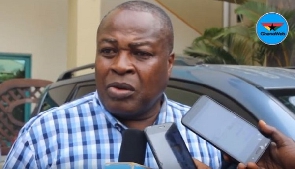PUTTING money back into the pockets of the people will be a top priority in next year?s budget, information reaching The Statesman suggests.
Speaking to this paper following the recent ministerial conference, held in Akosombo to discuss the 2006 budget, sources said the importance of job creation was key to the discussions and will be central to next year?s budget. The race is now on to find the estimated extra ?5 trillion ($550m) to boost the productive sector of the economy. Ministers are back this week at Akosombo to crunch the huge figures that are being threatened by the delay in the multilateral debt relief pledge given to Ghana and 17 others earlier this year. What is, however, certain is that the 2006 budget will mark a shift away from a focus on macro-economic stability to a greater emphasis on productivity, and improvement at a micro-economic level, sources said. Creating employment for youth looks set to be a particular focus, with plans to set up something akin to Kwame Nkrumah?s Workers and Builders Brigades innovation under the First Republic.
Codenamed ?Youth in Agriculture?, the policy is expected to eventually empower thousands of entrepreneurial young men and women in all 138 districts across the country.
A capital fund would be set up by Government to encourage more and more people into small and medium scale commercial farming.Government sees this as crucial to addressing the unemployment situation in the country and boosting economic activity in the rural areas, as captured under the Ghana Poverty Reduction Strategy paper.
Capital expenditure is also expected to increase significantly, according to our sources: with a projected increase of up to one-third.
The budget will be given an early reading for the first time this year, with the date tentatively set for Thursday, November 10.
The areas where capital spending is expected to increase dramatically are construction of public buildings, housing, roads, farming, and small and medium enterprise funding through the Venture Capital Fund.
The first medium term programme of the GPRS, which expires next year, identifies infrastructural development and rural development through modernised agriculture as two of the five main pillars of focus.
With the Youth in Agric proposal, Government is seeking to give out soft loans averaging ?20 million per farmer. Expected to be in two phases, the programme may require the provision of up to ?1 billion for a group of young entrepreneurs interested in going into commercial farming. The other phase involves supporting small scale young farmers with about ?20m loan facility. Government had earlier estimated that next year?s budget could increase by over ?4 trillion to an estimated ?39 trillion ($4 billion). However, this is seen by several analysts as conservative. Ken Ofori-Atta, Executive Chairman of Databank Financial Services, told The Statesman that Government could find the money to increase spending in the productive areas.
His view is supported by the fact that the 100 percent debt relief (both bilateral and multilateral debt), estimated to be about $6.4 billion, gives Government an unprecedented leeway since the First Republic to inject the economy with the necessary funds for a formidable productivity drive. However, Government seems a bit unnerved by the uncertainty surrounding the actual date that the newly pledged $4.3 billion multilateral debt relief will actualise. But, in its editorial today, The Statesman is urging Government to adopt what it describes as a Neo-Keynesian economic policy.
This paper argues: ?The ruling party must begin to embrace with gusto the economic philosophy which we have termed Neo-Keynesian. This, we define as increasing capital expenditure massively but not with the intention to open up the budget deficit without any short to medium term revenue expectation to close it up. It means spending big, but by finding creative and expansive ways to enhance revenue within the short to medium term. It means borrowing more and using the bulk of what you borrow to invest in the productive sectors.? The Statesman is not convinced by the argument currently making the rounds in the Cabinet that the delay in 100 percent multilateral debt relief is putting a check on Government?s plans to spend big next year. The expectation is that the debt relief package would set in by June 2006.
In this paper?s view, since the debt relief promised is irrevocable, Government should therefore not be shy of building up a budget deficit and offsetting that with the expected income from our donors in the near future.
The overall budget deficit for the last election year, 2004, was 3.2 percent, and 3.3 percent in 2003. This year?s deficit target is tightly pegged at 2.7 percent.
This year?s growth rate is estimated at 5.8 percent, that same as last year. However, this must jump above 8 percent if President Kufuor?s dream of achieving middle income status for Ghana by 2015 is to be realised. The overwhelming view of President Kufuor?s Cabinet is that Kwadwo Baah-Wiredu and his three deputy ministers at the Mininstry of Finance should find the money for big spending between now and 2008.
But, the Minority Spokesperson on Finance & Economic Planning is not convinced. Speaking to The Statesman yesterday, Moses Asaga said that as much as the 2006 budget should be production-oriented, ?I think the budget will be just like the other previous five ? focused on meeting IMF conditionalities, such as low budget deficit and low inflation driven economic policy. It will be tight fiscal policy as usual. Capital expenditure cannot be expected to increase by much because that would mean increasing public sector borrowing and that would mean offending the IMF,? he said sarcastically.
The MP for Nabdam continued: ?What the economy needs is a budget that can address unemployment through big spending in productive areas and capital investment. I am against single digit inflation at this stage of our development; it merely stifles growth. We need to spend to create more infrastructure, more jobs and to increase workers? salaries so that they can use their enhanced purchasing power to boost the economy. We also need to subsidise fuel prices. But, none of these can be expected in the next budget from a government obsessed with macro-economic stability.?
Click to view details



Business News of Wednesday, 2 November 2005
Source: The Statesman
















